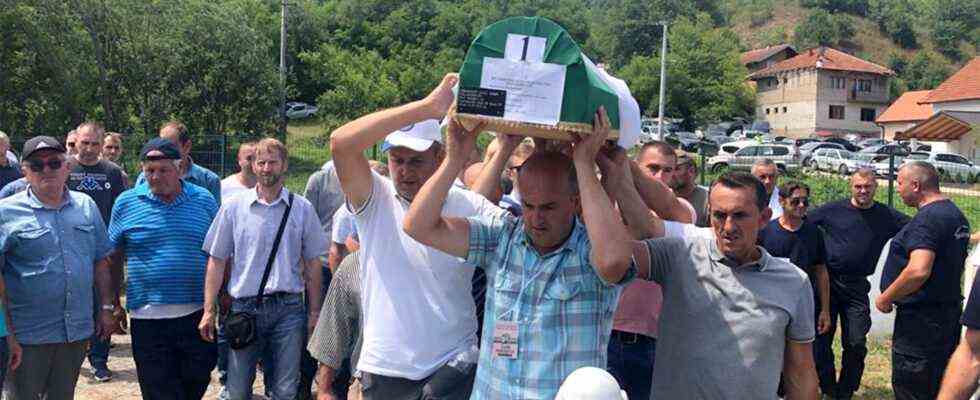report
Status: 07/12/2021 9:07 a.m.
26 years after the Srebrenica massacre, victims are still being identified and buried – like Azmir Osmanovic yesterday. He was 16 when he died. His relatives suffer most from the genocide denial.
From Clemens Verenkotte,
ARD studio Vienna
Azir Osmanovic and his sister Anera stand at the grave of their brother Azmir with relatives and friends. They pray together with the imam in the Potochari cemetery.
Azmir was 16 years old in July 1995 when he and his father fled to the surrounding mountains with his father after the fall of the UN protection zone of Srebrenica. After that, says Azir Osmanovic, the curator of the Potocari Memorial, he never saw his older brother again.
Days before the funeral on Sunday, Azir explains the circumstances under which he and his family learned of Azmir’s death: “He was found near the village of Susnjari in 2018,” says Azir. “According to some accounts, he died there. At the beginning of April this year, I learned that his remains had been identified. Actually only his skull was found.”
26 years after the death of his then 16-year-old brother, Azir Osmanovic (front center), his sister Anera, family members and friends were able to have Azmir buried.
Image: Clemens Verenkotte / ARD Vienna
Dissatisfied with the search for missing people
While on the run, he ran into a minefield with some friends and stepped on a mine. He is dissatisfied with the search for around 1,000 people missing from the Srebrenica genocide, says Azir Osmanovic, who has studied history and has worked as the memorial’s curator for over twelve years. He lives with his wife and three children in the eastern Bosnian town in the Serbian-dominated Republika Srpska.
Denied almost every day
In all these years he was only able to lead a single school class from the Republika Srpska through the museum, and most of them were Bosniak children. The genocide of 8,372 Bosniaks in July 1995 by the Bosnian-Serbian units under Ratko Mladic is denied almost every day in the city.
“Those who committed the genocide deny it every day,” says Azir. “For a normal person, someone who survived the genocide in Srebrenica, it is not at all easy to be exposed to genocide denial on a daily basis. We fight against it, but we live in such an unjust system that we as individuals cannot change anything.” . ”
Some of the perpetrators move freely in Srebrenica, says Azir Osmanovic, who was born in 1982. It is not easy for him to see them at large, to attend certain events with them.
Of course, it would be good if the courts in Bosnia-Herzegovina dealt with the war crimes – now, after the end of the Hague War Tribunal and the final verdict against ex-General Ratko Mladic, who has been sentenced to life imprisonment. But in view of the factual division of the country into the Bosniak-Croatian Federation and the Republika Srpska, he has his doubts.
Hoping for a law against genocide denial
Azir Osmanovic also hopes that there will finally be a legal ban on the denial of genocide in Srebrenica, which has so far failed due to the veto of the Republika Srpska: “I have said several times that the international community should impose the law on the prohibition of genocide denial. This law is supposed to doesn’t turn into a paper tiger, which is the case with many laws in Bosnia, “he says.
“The law should provide for draconian penalties for those who either only try, or especially for those who constantly deny the genocide in Srebrenica.” The law should determine penalties that genocide deniers fear. “This is the only way to prevent the denial of the genocide in Srebrenica.”
The mourners stand at the open grave of his brother Azmir, who was killed at the age of 16, the coffin covered with earth – then the relatives leave the fresh grave site.
My brother’s name was Azmir – burial 26 years after the Srebrenica genocide
Clemens Verenkotte, ARD Vienna, July 12th, 2021 8:22 am

